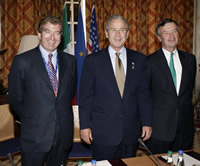The TransAtlantic Business Dialogue (TABD), is a coalition of around 150 European and US top corporate executives which was formed in 1995. It meets formally twice a year, at the World Economic Forum in Davos and at the US-EU Summit.
TABD is primarily concerned with promoting free trade - that is unregulated global trade. It develops policies that suit big business and seeks to remove regulations that hinder transnational corporate business. The US and the EU trade negotiators then present them to the World Trade Organization (WTO) as ‘done deals’. Public Citizen noted:
The TABD has been labelled the ‘new paradigm for trade liberalization’ by its proponents because it eliminates the ‘middle man’ from trade policy-making. That middle man is the U.S. and E.U. governments, and by extension, U.S. and E.U. citizens and consumer, labor and environmental NGOs.
The TABD is an advisory group within the TransAtlantic Business Council (TABC). It is a driving force behind the negotiations for a Transatlantic Trade and Investment Partnership (TTIP).
 President Bush with TABD chairs |
Reference: ‘About the TABD’, TransAtlantic Business Dialogue, accessed on 6 November 2004; ‘MAI Shell Game - the Transatlantic Economic Partnership (TEP)’, Public Citizen, 2009.
Because its membership consists of corporate CEOs of large transnational corporations, TABD has high level daily access to governments and uses it to pressure them to remove trade barriers, “including costly inefficiencies caused by excessive regulation”. TABD is jointly convened by the US Administration and the European Commission but “managed and driven” and funded by industry. The Clinton Administration “established an entire inter-agency working group just to work on the TABD’s demands.” |
Corporate Europe Observatory claimed that:
Over the past few years, the TABD has presented its demands in the form of a ‘scorecard’, setting ‘priorities’ for governments to focus on, and even going as far as to set ‘deadlines’ for completion. The audacity of this ‘scorecard’ approach reflects the cosy relationship the TABD enjoys with government, and its conviction that its recommendations will be carried out.
Michael Treschow, TABD co-chair in 2001 and CEO of Electrolux, stated:
We are not a lobby group, but invited advisors. That contributes to the fact that the TABD has made great progress and in the course of the years has succeeded in pushing many of our priorities into practical policy.... It is relatively easy for us to get time together with top politicians and they listen to us. It is important that they know they have our support when for instance they want to launch a new trade round. We help to push them in the right direction
Al Gore told a TABD meeting in 1998: 'I know that you are proud of the fact that of the 129 recommendations TABD has made in the past three years, over 50 percent have been implemented into law. I wish we had that same level of success with Congress!'
The Corporate Europe Observatory noted in 2001:
After the wave of early successes, the TABD's main impact in the last few years seems to have been "defensive" - delaying, weakening or even dismantling a wide range of existing and proposed regulations, most of which aimed to protect the environment, consumers and workers.